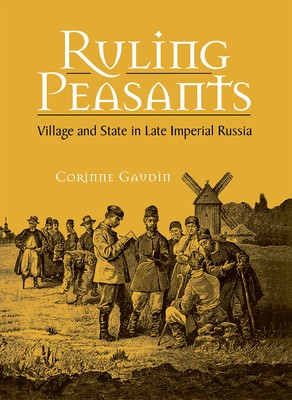
- We will send in 10–14 business days.
- Author: Corinne Gaudin
- Publisher: Northern Illinois University Press
- ISBN-10: 0875803709
- ISBN-13: 9780875803708
- Format: 16.1 x 23.6 x 2.5 cm, hardcover
- Language: English
- SAVE -10% with code: EXTRA
Reviews
Description
Who ruled the countryside in late Imperial Russia? On the rare occasions that tsarist administrators dared pose the question so boldly, they reluctantly answered that the peasants ruled. Historians have largely echoed this assessment, pointing to the state's failure to penetrate rural society as a key reason for the tsarist government's collapse.
Ruling Peasants challenges this dominant paradigm of the closed village by investigating the ways peasants engaged tsarist laws and the local institutions that were created in a series of contradictory legal, administrative, and agrarian reforms from the late 1880s to the eve of World War I. Gaudin's analysis of the practices of village assemblies, local courts, and elected peasant elders reveals a society riven by dissension. As villagers argued among themselves in terms defined by government, the peasants and their communities were transformed. Key concepts such as "custom," "commune," "property," and "fairness" were forged in such dialogue between the rulers and the ruled.
By the end of the nineteenth century, the framework of dialogue between the peasants and the state no longer worked. The more peasants used the institutions and laws available to them, the more they solicited the authorities, and the greater the obstacles to communication grew. Villagers' rising expectations for assistance foundered in the face of inconsistent state policies and arbitrary legal responses. Ironically, the success of often contradictory reforms--a success unrecognized by administrators themselves--contributed to undermining the state's legitimacy.
EXTRA 10 % discount with code: EXTRA
The promotion ends in 19d.06:37:28
The discount code is valid when purchasing from 10 €. Discounts do not stack.
- Author: Corinne Gaudin
- Publisher: Northern Illinois University Press
- ISBN-10: 0875803709
- ISBN-13: 9780875803708
- Format: 16.1 x 23.6 x 2.5 cm, hardcover
- Language: English English
Who ruled the countryside in late Imperial Russia? On the rare occasions that tsarist administrators dared pose the question so boldly, they reluctantly answered that the peasants ruled. Historians have largely echoed this assessment, pointing to the state's failure to penetrate rural society as a key reason for the tsarist government's collapse.
Ruling Peasants challenges this dominant paradigm of the closed village by investigating the ways peasants engaged tsarist laws and the local institutions that were created in a series of contradictory legal, administrative, and agrarian reforms from the late 1880s to the eve of World War I. Gaudin's analysis of the practices of village assemblies, local courts, and elected peasant elders reveals a society riven by dissension. As villagers argued among themselves in terms defined by government, the peasants and their communities were transformed. Key concepts such as "custom," "commune," "property," and "fairness" were forged in such dialogue between the rulers and the ruled.
By the end of the nineteenth century, the framework of dialogue between the peasants and the state no longer worked. The more peasants used the institutions and laws available to them, the more they solicited the authorities, and the greater the obstacles to communication grew. Villagers' rising expectations for assistance foundered in the face of inconsistent state policies and arbitrary legal responses. Ironically, the success of often contradictory reforms--a success unrecognized by administrators themselves--contributed to undermining the state's legitimacy.


Reviews